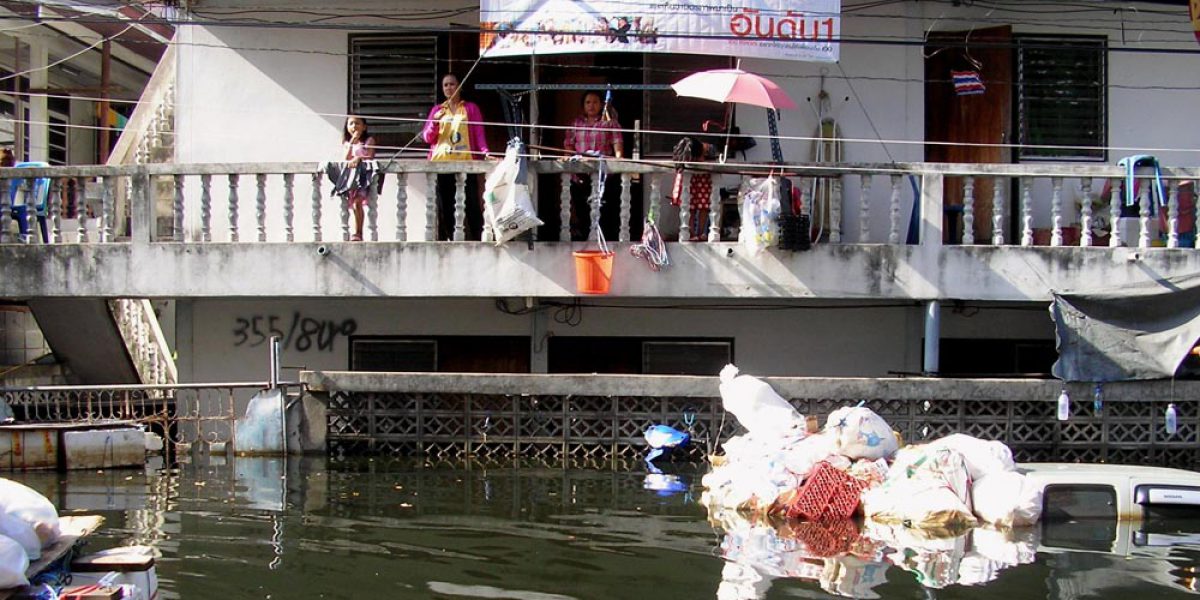Thailand: flooding leaves thousands of migrants in limbo
03 November 2011

Bangkok, 03 November 2011 – As the worst floods in a generation wreak havoc across Thailand, thousands of migrant workers fear losing their jobs and better prospects for the future.
According to Thailand’s Migrant Working Group (MWG) over 600,000 migrants have been affected by Thailand’s worst flooding in decades. With industrial estates in Ayutthaya, Nakhon Sawan and Pathum Thani swamped and many factories closed, thousands of Burmese have crossed the border or are staying with friends and relatives in border towns.
But it isn’t just the floodwaters that are making life difficult for the migrants.
Sanan, JRS staff member in Mae Sot, said opportunists are taking advantage of fleeing migrants. Mae Sot, a border town where many Burmese migrants live, is seeing large numbers of migrants returning to avoid flooding in Thailand.
“Some of our friends and partners have told me that when migrants from Burma return home or come back to Thailand, they have to pay brokers, police or soldiers from both sides of the border,” Sanan said.
In other reported incidents, migrants have been arrested by Thai police on charges of travelling outside of their permitted zones. A Burmese family was arrested at the Mo Chit bus station and asked to pay THB 5,000 (USD 160).
Migrant workers who remain in Thailand and are without registration papers or work permits are afraid of being exposed by going to government shelters. Some migrants have been turned away from these shelters. A Vietnamese family JRS referred to a government shelter had been refused because the shelter provides assistance only to Burmese, Laotian, and Cambodian migrants.
In a public statement, the Lawyer’s Council of Thailand reminded the government to respect human rights and offer humanitarian assistance to everyone, regardless of their legal status and nationality.
“Stranded migrant workers are reporting to NGOs that their documents have been lost or damaged in the flood or are reportedly being withheld by their employers, making it difficult to prove their status, move freely and access support,” said Louie Bacomo, assistant regional director of JRS Asia Pacific.
JRS Support
Since the flooding began, JRS has been monitoring and providing assistance to the 300 asylum seekers targeted under its Bangkok urban refugee program (URP). JRS maintained presence in the office during the holiday period and several Cambodians and Vietnamese asylum seekers showed up seeking assistance.
As the flooding worsened, JRS started to expand its service beyond the Bangkok urban refugee communities to include Thais, migrants and people in detention, providing temporary shelter, emergency cash assistance, food and essential non-food items.
Sanan reported from Mae Sot that “the Immigration Detention Centre has reported figures of up to 1,000 migrants per day being detained while processed for deportation. JRS has provided additional soy milk and drinking water upon the request of IDC staff for them to cope with the extraordinary number of detainees.”
JRS is also working with a network of NGOs supporting migrants by providing translators and relief items, sharing information and facilitating access to other services. “The network has established telephone hotlines in Burmese, Cambodian and Laotian languages, which aims to locate those affected, provide information, coordinate with government agencies and deliver assistance,” said Sermsiri Ingavanija, JRS advocacy officer who is coordinating with the network for the relief effort.
Through this network, JRS URP team assisted the Labor Rights Protection Network (LPN) in their relief and rescue operation in an area inundated for two weeks. LPN estimated hundreds of people including many migrants, Thais and children are trapped in buildings around Si Moom Muang market. Wanrob Wararasdr (Toi), JRS URP staff member, admired the solidarity shown by many people during the crisis amidst the occasions of opportunism.
“I asked LPN what we could do to help them and offered some money to pay for the boat fuel, “ Toi said. “They told me that we think about getting the people to safety first and to worry about the money later,” he said.
It is estimated that more migrants, many undocumented, remain trapped in inaccessible areas with difficulty communicating their locations as government and other relief agencies respond to more flooded areas and cope with mounting needs.
“Thank you for coming to help us. Now we know that you have not forgotten us,” a Cambodian asylum seeker told JRS during the relief and rescue operation.


